Although newer diesel trucks are far more complex than older models, they also have advantages over their older counterparts. When we heard famous EFILive tuner “Idaho” Rob Coddens had a 500-rwhp, LML-powered 2013 GMC Sierra he was playing around with that still had all its emissions hardware intact, we just had to see for ourselves. Unfortunately, the transmission hadn’t been upgraded for the extra power, so it was starting to check out.
Since Coddens plans to do plenty of dyno and dragstrip testing with his new Sierra, he wanted to make sure the Allison could handle the extra power, so he went to one of the best in the business -- Inglewood Transmission -- for a full rebuild, including new clutches and a new torque converter.
"“We found that all of the C3 clutches were starting to slip…”"
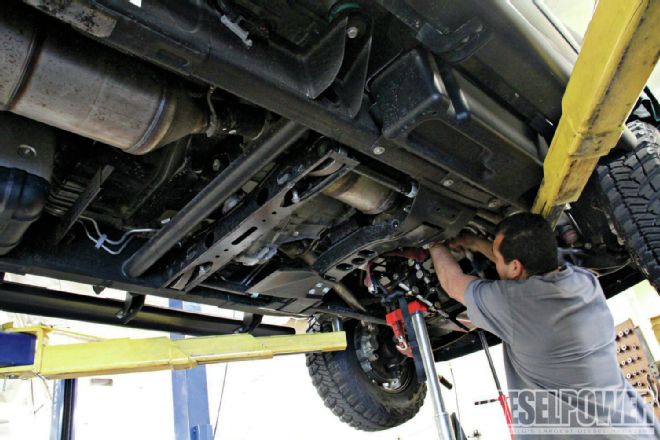
| 01.
01. Here, Inglewood Transmission technician Roger Ceballos is seen in the process of removing the transmission. The torque converter bolts, engine-to-transmission bolts, crossmember, driveshafts, transmission cooler lines, and electronics all must be removed before the transmission is lowered.
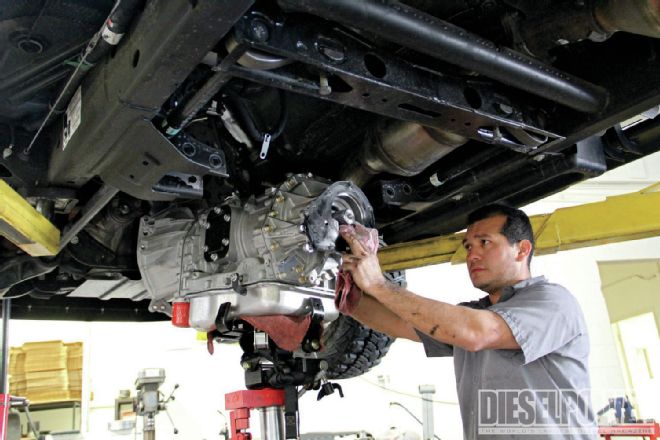
| 02.
02. After about 30 minutes, Ceballos was ready to lower the Allison 1000, which still looked to be in brand-new shape.
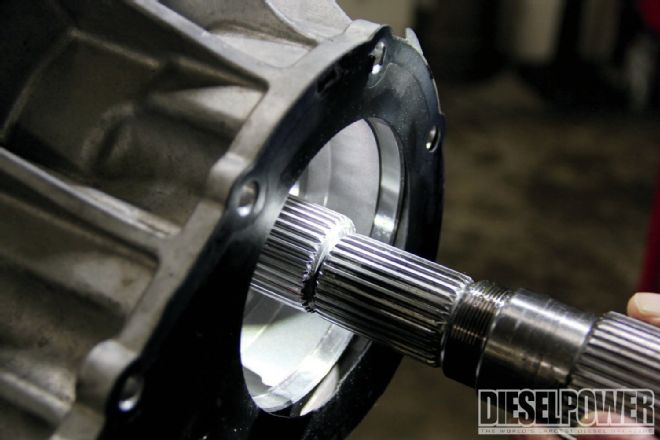
| 03.
03. One difference we immediately noticed was the size of the output shaft on the LML’s Allison transmission. With the additional horsepower and torque of the new engines (now at 397 hp and 765 lb-ft from the factory), a 1.63-inch-diameter output shaft (versus 1.48 inches for the previous years) was incorporated into the latest version of the transmission.
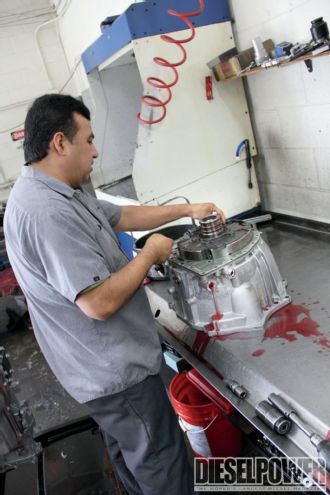
| 04.
04. Once the transmission was out of the truck, rebuilder Sal Hernandez started taking apart the Allison 1000 in sections so we could see how it faired at boosted power levels.
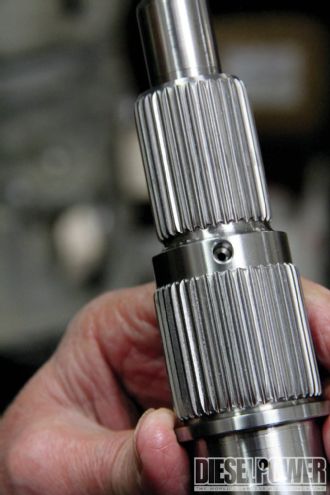
| 05.
05. Another noticeable difference about the new LML transmissions is that the lube passages are restricted (arrow) to lessen the load under part-throttle conditions, resulting in better fuel economy.
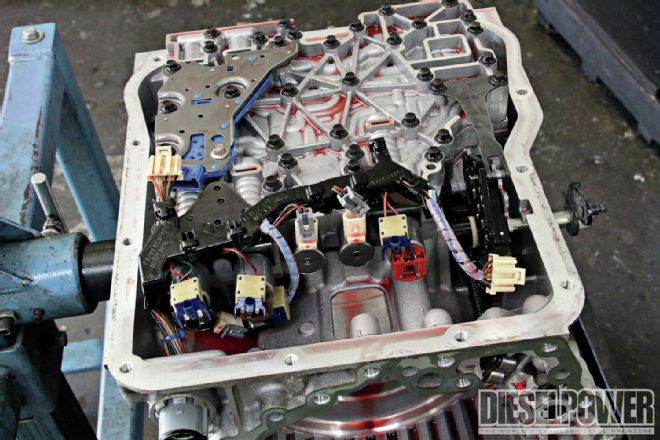
| 06.
06. With the pan off, we could now get a good look at the valvebody, where a few tricks would be performed to achieve maximum torque-handling capability.
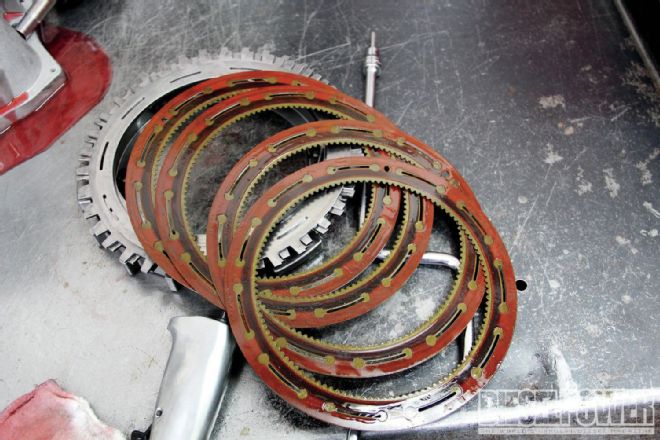
| 07.
07. First, a little black box of electronics was hooked to the solenoid on the valvebody, which helps with lockup and line pressure.

| 08.
08. When we got to the clutch packs inside the transmission, we found that all the C3 clutches (which are supposed to be a uniform brown color throughout) were starting to slip. The large black rings indicate a condition that’s commonly referred to as “burnt clutches.”
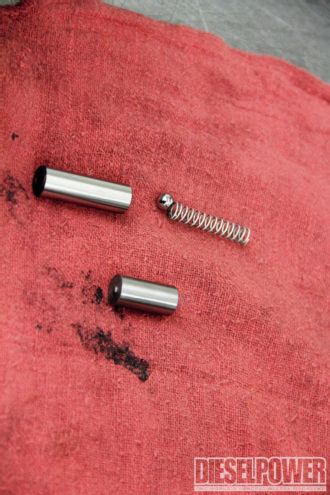
| 09.
09. Second, a revised accumulator spring produced by Ratio TEK for Inglewood Transmission was installed to help regulate line pressure.
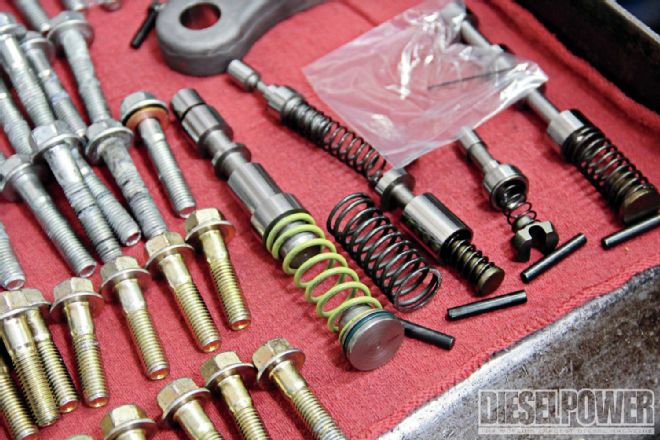
| 10.
10. Finally, a stiffer pressure regulator spring (the yellow one) was added. These modifications ensure line pressure is ramped up and stays there as long as the truck is under power.
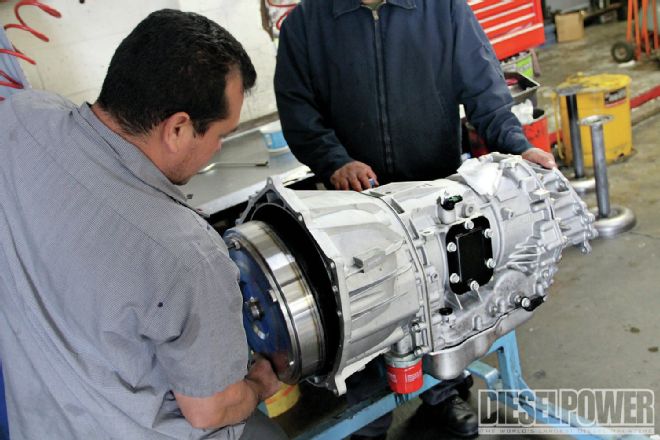
| 11.
11. The factory converter was replaced with a Goerend torque converter spec’d by Mike Lovrich, owner of Inglewood Transmission. This “ML” converter is very efficient at transferring power under part-throttle conditions and is perfect for everything from towing to drag racing when combined with Idaho Rob’s LML tuning.
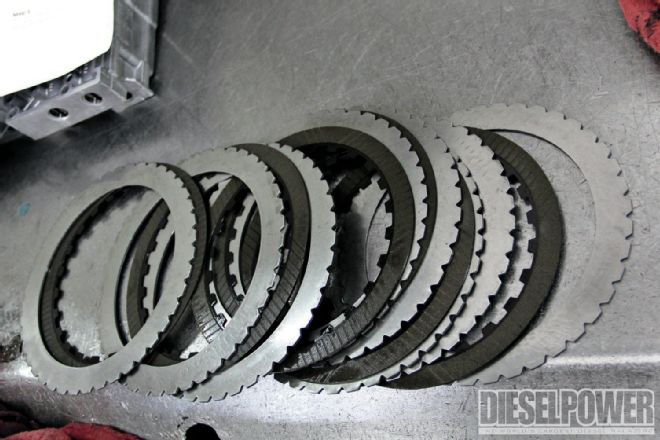
| 12.
12. To help the transmssion hold up to the onslaught of torque the engine produces, Raybestos GPZ clutches are used in the C3 clutch pack, and the count is increased from four to six clutches. An extra clutch is also added in the C2 pack.
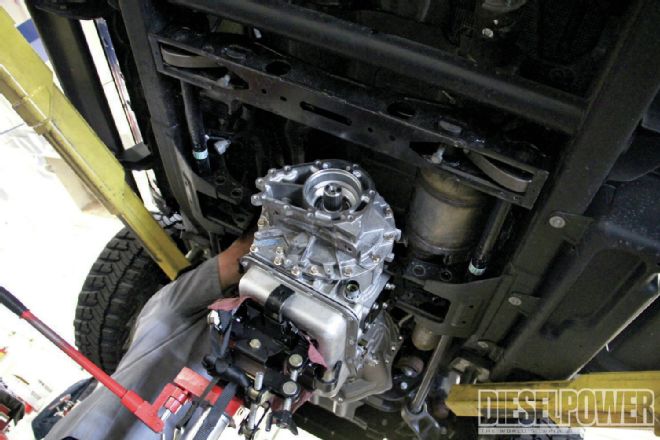
| 13.
13. Ceballos then installed the transmission just as it came out, hooking up the transfer case, driveshafts, electronics, and the cooler lines.
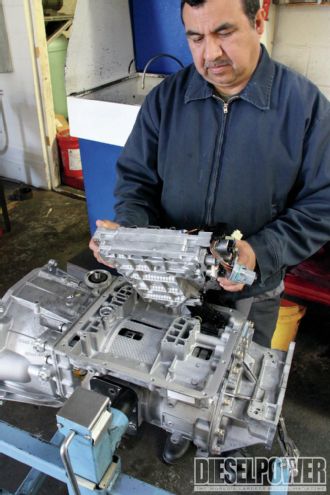
| 14.
14. After Hernandez was finished installing all the shafts, drums, and clutches, the revised valvebody was installed.
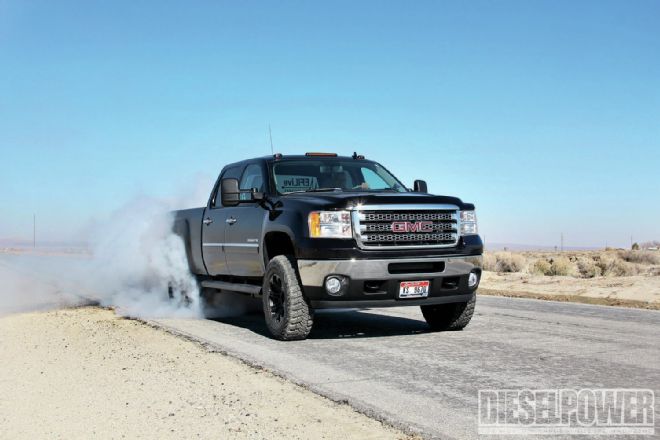
| 15.
15. With the new transmission and tuning, Rob’s GMC was no slouch, running a sports car-like 0-to-60-mph time of 5.9 seconds compared to the factory time of 7.2 seconds. It’s also trapped 98 mph in the quarter-mile at nearly 8,000 pounds, which backs up Rob’s claim of a DPF-on, 500-rwhp tune.
 | 01.
01. Here, Inglewood Transmission technician Roger Ceballos is seen in the process of removing the transmission. The torque converter bolts, engine-to-transmission bolts, crossmember, driveshafts, transmission cooler lines, and electronics all must be removed before the transmission is lowered.
| 01.
01. Here, Inglewood Transmission technician Roger Ceballos is seen in the process of removing the transmission. The torque converter bolts, engine-to-transmission bolts, crossmember, driveshafts, transmission cooler lines, and electronics all must be removed before the transmission is lowered.
 | 02.
02. After about 30 minutes, Ceballos was ready to lower the Allison 1000, which still looked to be in brand-new shape.
| 02.
02. After about 30 minutes, Ceballos was ready to lower the Allison 1000, which still looked to be in brand-new shape.
 | 03.
03. One difference we immediately noticed was the size of the output shaft on the LML’s Allison transmission. With the additional horsepower and torque of the new engines (now at 397 hp and 765 lb-ft from the factory), a 1.63-inch-diameter output shaft (versus 1.48 inches for the previous years) was incorporated into the latest version of the transmission.
| 03.
03. One difference we immediately noticed was the size of the output shaft on the LML’s Allison transmission. With the additional horsepower and torque of the new engines (now at 397 hp and 765 lb-ft from the factory), a 1.63-inch-diameter output shaft (versus 1.48 inches for the previous years) was incorporated into the latest version of the transmission.
 | 04.
04. Once the transmission was out of the truck, rebuilder Sal Hernandez started taking apart the Allison 1000 in sections so we could see how it faired at boosted power levels.
| 04.
04. Once the transmission was out of the truck, rebuilder Sal Hernandez started taking apart the Allison 1000 in sections so we could see how it faired at boosted power levels.
 | 05.
05. Another noticeable difference about the new LML transmissions is that the lube passages are restricted (arrow) to lessen the load under part-throttle conditions, resulting in better fuel economy.
| 05.
05. Another noticeable difference about the new LML transmissions is that the lube passages are restricted (arrow) to lessen the load under part-throttle conditions, resulting in better fuel economy.
 | 06.
06. With the pan off, we could now get a good look at the valvebody, where a few tricks would be performed to achieve maximum torque-handling capability.
| 06.
06. With the pan off, we could now get a good look at the valvebody, where a few tricks would be performed to achieve maximum torque-handling capability.
 | 07.
07. First, a little black box of electronics was hooked to the solenoid on the valvebody, which helps with lockup and line pressure.
| 07.
07. First, a little black box of electronics was hooked to the solenoid on the valvebody, which helps with lockup and line pressure.
 | 08.
08. When we got to the clutch packs inside the transmission, we found that all the C3 clutches (which are supposed to be a uniform brown color throughout) were starting to slip. The large black rings indicate a condition that’s commonly referred to as “burnt clutches.”
| 08.
08. When we got to the clutch packs inside the transmission, we found that all the C3 clutches (which are supposed to be a uniform brown color throughout) were starting to slip. The large black rings indicate a condition that’s commonly referred to as “burnt clutches.”
 | 09.
09. Second, a revised accumulator spring produced by Ratio TEK for Inglewood Transmission was installed to help regulate line pressure.
| 09.
09. Second, a revised accumulator spring produced by Ratio TEK for Inglewood Transmission was installed to help regulate line pressure.
 | 10.
10. Finally, a stiffer pressure regulator spring (the yellow one) was added. These modifications ensure line pressure is ramped up and stays there as long as the truck is under power.
| 10.
10. Finally, a stiffer pressure regulator spring (the yellow one) was added. These modifications ensure line pressure is ramped up and stays there as long as the truck is under power.
 | 11.
11. The factory converter was replaced with a Goerend torque converter spec’d by Mike Lovrich, owner of Inglewood Transmission. This “ML” converter is very efficient at transferring power under part-throttle conditions and is perfect for everything from towing to drag racing when combined with Idaho Rob’s LML tuning.
| 11.
11. The factory converter was replaced with a Goerend torque converter spec’d by Mike Lovrich, owner of Inglewood Transmission. This “ML” converter is very efficient at transferring power under part-throttle conditions and is perfect for everything from towing to drag racing when combined with Idaho Rob’s LML tuning.
 | 12.
12. To help the transmssion hold up to the onslaught of torque the engine produces, Raybestos GPZ clutches are used in the C3 clutch pack, and the count is increased from four to six clutches. An extra clutch is also added in the C2 pack.
| 12.
12. To help the transmssion hold up to the onslaught of torque the engine produces, Raybestos GPZ clutches are used in the C3 clutch pack, and the count is increased from four to six clutches. An extra clutch is also added in the C2 pack.
 | 13.
13. Ceballos then installed the transmission just as it came out, hooking up the transfer case, driveshafts, electronics, and the cooler lines.
| 13.
13. Ceballos then installed the transmission just as it came out, hooking up the transfer case, driveshafts, electronics, and the cooler lines.
 | 14.
14. After Hernandez was finished installing all the shafts, drums, and clutches, the revised valvebody was installed.
| 14.
14. After Hernandez was finished installing all the shafts, drums, and clutches, the revised valvebody was installed.
 | 15.
15. With the new transmission and tuning, Rob’s GMC was no slouch, running a sports car-like 0-to-60-mph time of 5.9 seconds compared to the factory time of 7.2 seconds. It’s also trapped 98 mph in the quarter-mile at nearly 8,000 pounds, which backs up Rob’s claim of a DPF-on, 500-rwhp tune.
| 15.
15. With the new transmission and tuning, Rob’s GMC was no slouch, running a sports car-like 0-to-60-mph time of 5.9 seconds compared to the factory time of 7.2 seconds. It’s also trapped 98 mph in the quarter-mile at nearly 8,000 pounds, which backs up Rob’s claim of a DPF-on, 500-rwhp tune.